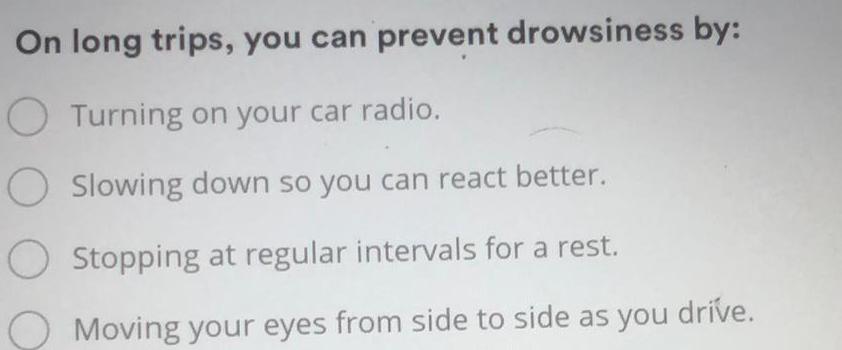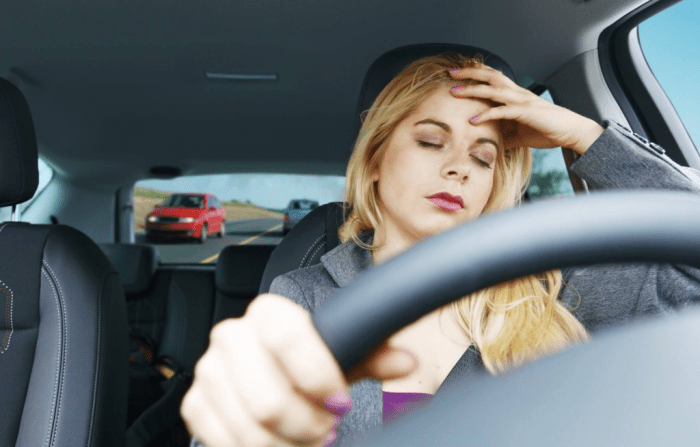On long trips you can prevent drowsiness by: – On long trips, preventing drowsiness is crucial for ensuring safety and maintaining focus. This comprehensive guide provides actionable strategies to help drivers stay alert and combat fatigue during extended journeys.
By implementing these tips, drivers can significantly reduce the risk of drowsy driving and enhance their overall driving experience.
Ways to Prevent Drowsiness on Long Trips: On Long Trips You Can Prevent Drowsiness By:
Driving long distances can be physically and mentally demanding, making it crucial to stay alert and focused. Drowsiness is a significant hazard that can impair judgment, reaction time, and decision-making abilities.
Getting Enough Sleep Before a Long Drive
Getting adequate sleep before a long drive is essential. Aim for at least seven to eight hours of restful sleep the night before. Avoid alcohol or caffeine before bed, as these substances can interfere with sleep quality.
Taking Breaks During a Long Drive
Regular breaks can help prevent drowsiness and keep you refreshed. Plan to stop every two to three hours or every 100 to 150 miles. Get out of the car, stretch your legs, and move around to promote blood flow and alertness.
Strategies for Maintaining Alertness

Caffeine and Other Stimulants
Caffeine can provide a temporary boost of alertness. However, it’s important to consume caffeine in moderation and avoid excessive amounts, as it can lead to anxiety and jitteriness.
Staying Hydrated
Dehydration can contribute to fatigue and drowsiness. Stay hydrated by drinking plenty of water or electrolyte-rich beverages throughout your drive.
Distractions and Hazards

Common Distractions
Distractions such as texting, talking on the phone, or eating while driving can divert your attention and increase the risk of drowsiness.
Dangers of Driving While Drowsy
Driving while drowsy can be just as dangerous as driving under the influence of alcohol. It can lead to impaired judgment, slower reaction times, and increased risk of accidents.
Passenger Involvement

Designated “Co-pilot”
Having a designated “co-pilot” can help keep the driver alert. The co-pilot can monitor the driver’s alertness, provide conversation, and assist with navigation.
Tips for Passengers
Passengers can help prevent drowsiness by engaging in conversations, singing along to music, or playing games that require focus.
Vehicle Considerations
Comfortable and Well-Maintained Vehicle
A comfortable and well-maintained vehicle can promote alertness. Ensure your seat is adjusted properly, the temperature is comfortable, and the vehicle is in good working order.
Cruise Control and Assistive Technologies
Cruise control can help reduce fatigue by maintaining a steady speed. Other assistive technologies, such as lane departure warnings and adaptive cruise control, can provide additional support.
Other Prevention Methods

Listening to Music or Podcasts
Listening to upbeat music or engaging podcasts can help keep you alert and entertained during a long drive.
Anti-Drowsiness Devices, On long trips you can prevent drowsiness by:
There are various anti-drowsiness devices available, such as headrest alarms and wristbands that vibrate when the driver’s head tilts forward.
Managing Stress and Fatigue
Before and during a long drive, it’s important to manage stress and fatigue. Engage in relaxation techniques such as deep breathing or meditation, and avoid strenuous activities before driving.
Query Resolution
What are the common causes of drowsiness while driving?
Insufficient sleep, monotonous driving conditions, dehydration, and certain medications can contribute to drowsiness behind the wheel.
How can passengers assist in preventing drowsiness?
Passengers can serve as designated “co-pilots,” engaging the driver in conversation, monitoring their alertness, and offering to take over driving if necessary.
Are there any effective anti-drowsiness devices available?
Anti-drowsiness devices, such as lane departure warning systems and vibration alerts, can provide additional support in maintaining alertness while driving.